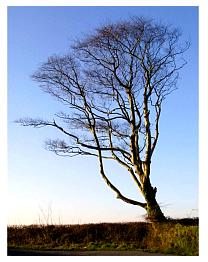Deep Ecological Awareness Is Spiritual Awareness


The sense in which we use the term "ecological" is associated with a specific philosophical school, founded in the early 1970s by the Norwegian philosopher Arne Naess (1912-2009) with the distinction between "shallow" and "deep" ecology. Since then, this distinction has been widely accepted as a very useful term for referring to a major division within contemporary environmental thought.
Shallow ecology is anthropocentric, or human-centered. It views humans as above or outside of nature, as the source of all value, and ascribes only instrumental, or "use," value to nature. Deep ecology does not separate humans — nor anything else — from the natural environment. It does sees the world not as a collection of isolated objects but as a network of phenomena that are fundamentally interconnected and interdependent. Deep ecology recognizes the intrinsic value of all living beings and views humans as just one particular strand in the web of life.
Ultimately, deep ecological awareness is spiritual awareness. When the concept of the human spirit is understood as the mode of consciousness in which the individual feels a sense of belonging, of connectedness, to the cosmos as a whole, it becomes clear that ecological awareness is spiritual in its deepest essence. Hence, the emerging new vision of reality, based on deep ecological awareness, is consistent with the so-called "perennial philosophy" of spiritual traditions.
There is another way in which Arne Naess characterized deep ecology. "The essence of deep ecology," he wrote, "is to ask deeper questions." This is also the essence of a paradigm shift. We need to be prepared to question every single aspect of the old paradigm. Eventually, we will not need to abandon all our old concepts and ideas, but before we know that we need to be willing to question everything. So, deep ecology asks profound questions about the very foundations of our modern, scientific, industrial, growth-oriented, materialistic worldview and way of life. It questions this entire paradigm from an ecological perspective: from the perspective of our relationships to one another, to future generations, and to the web of life of which we are part.
From the book "The Systems View of Life: A Unifying Vision" by Fritjof Capra and Pier Luigi Luisi.
SEED QUESTIONS FOR REFLECTION: What does deep ecological awareness mean to you? Can you share a personal experience of a time you felt such an awareness? What helps you develop a deep ecological awareness?
Add Your Reflection
6 Past Reflections

On Feb 13, 2018 Lonner Holden wrote :
I think of the experience of "awe" as a kind of cosmic empathy, where we feel felt, seen, accepted and held by the greater natural world of which we are part. Lonner Holden
1 reply: Me | Post Your Reply

On Feb 13, 2018 Sunil, Bangalore wrote :
Death is not born and Life never dies.It is always the manifestation of the same eternal life consciousness in all the creations-human,environmental and all other nature.THe same soul permeates all over the inclusive universe..This is experienced when you search & find " Who Am I"? Finding ones true nature is all that is required to understand the reality of the present oneness without past or future.
Post Your Reply

On Feb 11, 2018 Amy wrote :
For me, it was taught. When I was a kid, I thought my father treated the birds, his garden, lakes, rivers and all of nature with greater love than he did his own family. Nature spoke his language and he, in turn, would naturally listen. Dad, one with the nature he found himself in, danced with it! Loving nature as he did himself, he demonstrated his deep ecological awareness EVERYDAY.
Post Your Reply

On Feb 9, 2018 Jagdish P Dave wrote :
Post Your Reply

On Feb 9, 2018 david doane wrote :
Shallow ecological awareness is the dualistic view that sees us as separate from nature and supports exploiting nature. It is shallow, and harmful. Deep ecological awareness means to me that there is one
activity/process/network/web called the universe that we are inseparably part of, in which all that is including us humans is fundamentally and totally interrelated and interconnected. As Thich Nhat Hanh says, we are interbeings that interarise in interisness. I have had this awareness for a long time, and it helps me see that all is one, which is the foundation of my spirituality. It feels very right for me and I allow and nurture the ongoing growth and deepening of such ecological awareness.